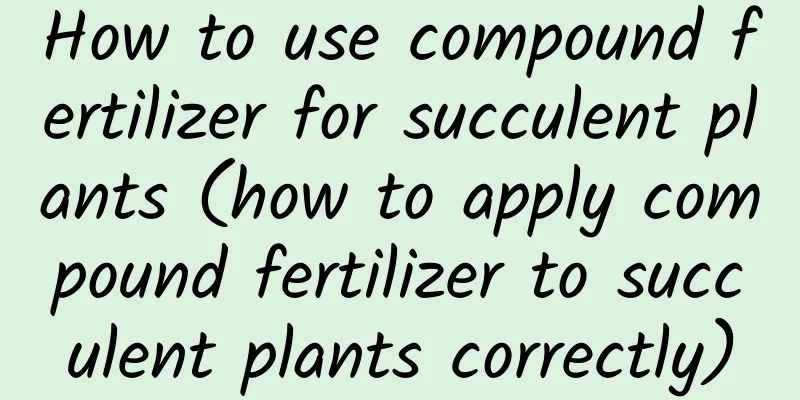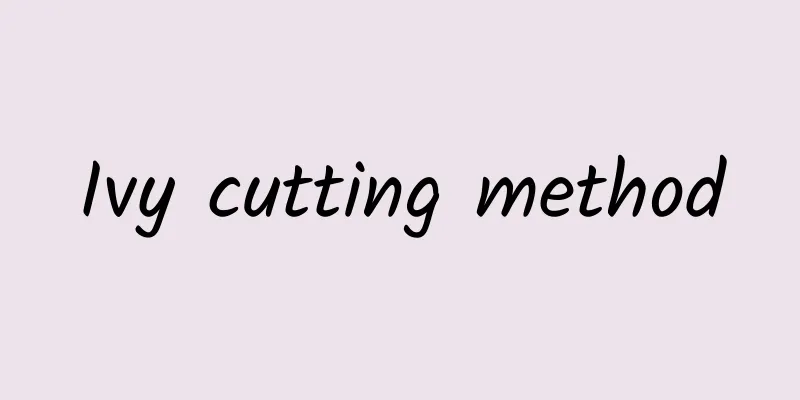How to use compound fertilizer for succulent plants (how to apply compound fertilizer to succulent plants correctly)

|
Succulent plants can tolerate barrenness and drought, and can survive even on barren roofs, deserts and rocks. They prefer an environment with plenty of sunlight, warm and dry conditions. The demand for nutrients is not high, but the soil must be loose and breathable and contain certain mineral particles, which is beneficial to improve the soil's aggregate structure and increase the air permeability of the root system. In addition to helping with coloring, it can also effectively prevent waterlogging and root rot. How to use compound fertilizer to grow succulents1. Granular slow-release fertilizer This is the most common fertilizer at present. This granular slow-release fertilizer is specially designed for succulents. It is very effective and the fertilizer is released gradually. Fertilizing succulents is not very important. Generally, a few granules of slow-release fertilizer like this will not be needed for a long time. It should be a kind of compound fertilizer. Granular slow-release fertilizer (picture) 2. Potash Fertilizer It promotes photosynthesis, increases stem hardness, and promotes the growth of fleshy stems and roots. If you want to grow old piles, you can use fertilizers containing potassium as the main element. 3. Phosphate Fertilizer It is a fertilizer that promotes early flowering and fruiting of succulents. It improves the drought resistance and drought tolerance of succulents. If you want succulents to bloom early or supplement nutrients during flowering, this fertilizer is still relatively good. Nitrogen fertilizer (picture) 4. Nitrogen Fertilizer The effect is to make the leaves of succulents bigger and healthier, slow down the aging of the leaves, and increase the yield. If you want the leaves of succulents to grow bigger, you can try using this nitrogen fertilizer, but the amount should be controlled. [ Specific application method ] Compound fertilizer generally contains two or more nutrient elements and is a compound fast-dissolving and long-acting fertilizer. Its advantages are good solubility and high fertilizer efficiency, but its disadvantages are that it is difficult to control the concentration and frequent use can easily lead to soil alkalinity. It is recommended to fully dissolve and dilute it to 1000 times before using it on succulents, and the frequency of use should not be too frequent, only 1-2 times during the growth period is sufficient . In addition to compound fertilizers, there are many other options for succulent flower fertilizers.With the continuous development of gardening technology, the update and iteration of fertilizers is also very fast. In recent years, many special fertilizers for potted plants with good reputation have appeared. For example: Huaduoduo water-soluble fertilizer, slow-release fertilizer, controlled-release fertilizer, etc. Huaduoduo not only adjusts the ratio of nitrogen, phosphorus and potassium on the basis of compound fertilizer, but also provides a variety of nitrogen, phosphorus and potassium ratios to choose from, and can make reasonable choices for different growth stages. Slow-release fertilizers and controlled-release fertilizers are resin-coated fertilizers that can control the release rate of fertilizer effects. The release cycle can last from 3 to 6 months. They have higher absorption and utilization rates and are relatively safer . The main purpose of growing flowers is to beautify the environment and promote natural growth, and flower fertilizer is just the icing on the cake! On the basis of choosing a flower soil with balanced nutrients, it is actually not necessary to use fertilizer frequently. On the contrary, too frequent use of fertilizer can easily lead to excessive growth of potted plants and reduced resistance. The basic principle is to apply fertilizer in small amounts frequently and to rather have less than too much. |
<<: How to quickly root green radish cuttings (green radish cuttings method and care tips)
Recommend
How to care for cactus after changing soil (Precautions for changing pots and soil for cactus)
1. Soil preparation for cactus repotting The orig...
There are wild succulents everywhere, each one is as plump as a meat bun. Should I dig them?
Wild Stone Lotus Echeveria is the most common var...
Cultivation method of red scale syzygium
Growth habit The red-scaled syzygium usually grow...
How to prolong the flowering period of peony and regulate the flowering period of peony
1. How to prolong the flowering period 1. Prevent...
How to propagate Tradescantia by cuttings
time The cutting propagation of Tradescantia is m...
Can red maple leaves be grown indoors?
Can red maple leaves be grown indoors? Red maple ...
How long does it take for petunia to bloom? How long does it take from sowing to flowering?
How long does it take for petunias to bloom? Afte...
The efficacy and function of hand fragrance
1. Sedation and hypnosis Fragrance can relieve pe...
When is the best time to plant roses?
When is the best time to plant roses? Generally, ...
How to grow Milan to make it bloom
Milan Blossoms The flowering period of Milan is g...
How to repot Milan flowers
time Milan is a tropical plant, suitable for grow...
Does Snow Purple Bougainvillea bloom frequently?
The flowers of Snow Purple Bougainvillea are purp...
How to grow golden ball tree well (how to grow golden ball tree stump bonsai well and make it survive and bear fruit)
How to grow golden marble bonsai well Golden ball...
Are carnations poisonous?
Are carnations poisonous? First of all, I want to...
How to manage hydrangeas in winter?
Hydrangea , also known as wood hydrangea , hydran...









